![[rori] Sakurasou no Pet na Kanojo - 08 [25FE7EF2].mkv_snapshot_06.08_[2012.11.28_10.04.31] [rori] Sakurasou no Pet na Kanojo - 08 [25FE7EF2].mkv_snapshot_06.08_[2012.11.28_10.04.31]](https://lh5.ggpht.com/-W5RyznvRgy8/ULVy8RSaBwI/AAAAAAACMhk/Gr3-2h7_x3I/%25255Brori%25255D%252520Sakurasou%252520no%252520Pet%252520na%252520Kanojo%252520-%25252008%252520%25255B25FE7EF2%25255D.mkv_snapshot_06.08_%25255B2012.11.28_10.04.31%25255D_thumb.jpg?imgmax=800) |
![[rori] Sakurasou no Pet na Kanojo - 08 [25FE7EF2].mkv_snapshot_12.29_[2012.11.28_10.11.28] [rori] Sakurasou no Pet na Kanojo - 08 [25FE7EF2].mkv_snapshot_12.29_[2012.11.28_10.11.28]](https://lh5.ggpht.com/-sw1nzq-AVTI/ULVy-wX0bPI/AAAAAAACMh0/Z8U01JQm52k/%25255Brori%25255D%252520Sakurasou%252520no%252520Pet%252520na%252520Kanojo%252520-%25252008%252520%25255B25FE7EF2%25255D.mkv_snapshot_12.29_%25255B2012.11.28_10.11.28%25255D_thumb.jpg?imgmax=800) |
![[rori] Sakurasou no Pet na Kanojo - 08 [25FE7EF2].mkv_snapshot_20.26_[2012.11.28_10.19.45] [rori] Sakurasou no Pet na Kanojo - 08 [25FE7EF2].mkv_snapshot_20.26_[2012.11.28_10.19.45]](https://lh3.ggpht.com/-5891bJvvKlk/ULVzBlkjN0I/AAAAAAACMiA/cHYjGutooHk/%25255Brori%25255D%252520Sakurasou%252520no%252520Pet%252520na%252520Kanojo%252520-%25252008%252520%25255B25FE7EF2%25255D.mkv_snapshot_20.26_%25255B2012.11.28_10.19.45%25255D_thumb.jpg?imgmax=800) |
Whatever else you may think about it, watching Sakurasou is certainly never a boring experience.
As this episode played out, I was reminded of the start of the old nursery rhyme “There Was a Little Girl” (actually a poem by Longfellow):
There was a little girl, who had a little curl
Right in the middle of her forehead,
And when she was good, she was very, very good,
But when she was bad she was horrid.
We certainly had the very, very good plenty in the first four episodes – and last week’s definitely gave us the horrid. But what struck me this week is that Sakurasou is very unusual in the way it can whipsaw back and forth between very good and horrid in a heartbeat, within the same episode. There were moments this week that were almost shocking in how emotionally accurate and penetrating they were, and others that were excruciatingly tired and unfunny (I’m starting to think this is a show that’s better off with the “less is more” philosophy when it comes to trying to be a comedy).
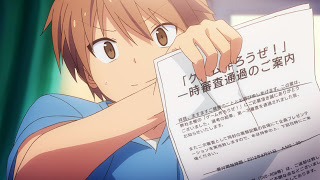 Of course, it’s inescapable in reading the lines of that poem that it could just as easily apply to Okada Mari, who’s the lead writer for this adaptation. She didn’t write last week’s disastrous episode – fascinatingly, it was the novelist himself who perpetrated that crime – but it still makes me wonder if this story fits her perfectly in ways both good and bad. It’s not entirely coincidental, I don’t think, that many of the problems I have with Sakurasou began when Nanami arrived on the scene, but it’s not just her (we’ll pretend the imouto thing never happened) – the show seems to slip into hackneyed and derivative slapstick an inexplicable amount of the time, considering how smart the writing can be. I’d also add that for whatever reason, Misaki’s voice cut through me like a knife this week – maybe it was me, or maybe she was more over-the-top than usual, because she hasn’t bothered me that much in the past.
Of course, it’s inescapable in reading the lines of that poem that it could just as easily apply to Okada Mari, who’s the lead writer for this adaptation. She didn’t write last week’s disastrous episode – fascinatingly, it was the novelist himself who perpetrated that crime – but it still makes me wonder if this story fits her perfectly in ways both good and bad. It’s not entirely coincidental, I don’t think, that many of the problems I have with Sakurasou began when Nanami arrived on the scene, but it’s not just her (we’ll pretend the imouto thing never happened) – the show seems to slip into hackneyed and derivative slapstick an inexplicable amount of the time, considering how smart the writing can be. I’d also add that for whatever reason, Misaki’s voice cut through me like a knife this week – maybe it was me, or maybe she was more over-the-top than usual, because she hasn’t bothered me that much in the past.
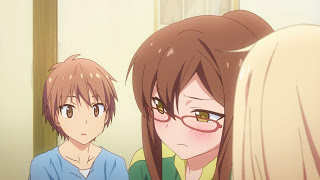 Much of the problem is Nanami, though, and I think it’s as much the changes she caused in the chemistry as it is herself (though there’s that too, as she’s the most clichéd character in the regular cast). Formula seems to follow her everywhere – misunderstanding humor, “Pervert!” jokes, familiar osananajimi angst. I think we had a really interesting story brewing already, and it didn’t need all that played-out baggage strapped to the roof like Mitt Romney’s dog. Even early on I noted that there seemed to be a struggle between a series trying to be bold and original and one trying to be a well-executed anime standard, and when Nanami moved into Sakurasou those fault lines became much more pronounced.
Much of the problem is Nanami, though, and I think it’s as much the changes she caused in the chemistry as it is herself (though there’s that too, as she’s the most clichéd character in the regular cast). Formula seems to follow her everywhere – misunderstanding humor, “Pervert!” jokes, familiar osananajimi angst. I think we had a really interesting story brewing already, and it didn’t need all that played-out baggage strapped to the roof like Mitt Romney’s dog. Even early on I noted that there seemed to be a struggle between a series trying to be bold and original and one trying to be a well-executed anime standard, and when Nanami moved into Sakurasou those fault lines became much more pronounced.
 If there’s a case to be made for Nanami’s presence, it’s as a catalyst for moving both Mashiro’s character arc and her relationship with Sorata. We have seen legitimate growth with her (that was a worry for a while) in the way she’s obviously playing up her own incompetence as a way to keep Sorata bonded to her, and her jealousy of Nanami’s familiarity with him. Her character is a bit extreme to be believable sometimes, but in context it’s believable that she’s so socially inept that she doesn’t actually understand what she’s feeling as jealousy – just as “I don’t like it”. It feels to me as if the “I need to feel love to write about love” angle is way too close to the love hotel episode, but that journey for Mashiro is one of the two major plotlines in the story.
If there’s a case to be made for Nanami’s presence, it’s as a catalyst for moving both Mashiro’s character arc and her relationship with Sorata. We have seen legitimate growth with her (that was a worry for a while) in the way she’s obviously playing up her own incompetence as a way to keep Sorata bonded to her, and her jealousy of Nanami’s familiarity with him. Her character is a bit extreme to be believable sometimes, but in context it’s believable that she’s so socially inept that she doesn’t actually understand what she’s feeling as jealousy – just as “I don’t like it”. It feels to me as if the “I need to feel love to write about love” angle is way too close to the love hotel episode, but that journey for Mashiro is one of the two major plotlines in the story.
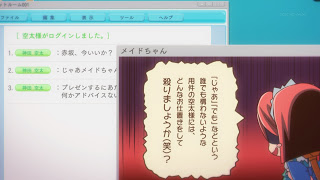 The best part of this ep for me, by far, was the way it portrayed Sorata’s experience with the presentation and his feelings in the aftermath. Damn, it was harsh and unforgiving – but it communicated Sorata’s nervousness and intense feeling of inadequacy beautifully. It also showed exactly what happens when you over-prepare for a presentation, as the introduction of one random element – the well-meaning question from game designing legend Fujisawa Kazuki – threw him completely off his game. Sorata has never been more sympathetic than he was here – just a 16 year-old kid woefully unprepared to face such an adult situation, someone who wanted something so badly he could taste it but lacked the confidence and experience to make his own case.
The best part of this ep for me, by far, was the way it portrayed Sorata’s experience with the presentation and his feelings in the aftermath. Damn, it was harsh and unforgiving – but it communicated Sorata’s nervousness and intense feeling of inadequacy beautifully. It also showed exactly what happens when you over-prepare for a presentation, as the introduction of one random element – the well-meaning question from game designing legend Fujisawa Kazuki – threw him completely off his game. Sorata has never been more sympathetic than he was here – just a 16 year-old kid woefully unprepared to face such an adult situation, someone who wanted something so badly he could taste it but lacked the confidence and experience to make his own case.
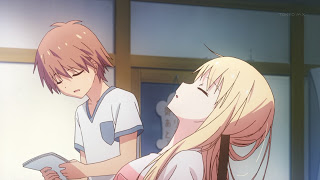 This, of course, is the other major plotline of Sakurasou – Sorata’s journey of self-discovery, and one senses that the novelist is most comfortable with this material for it’s here that the story achieves real originality and poignancy. As good as the presentation scene was the follow-up scene as he sat fighting back tears on the steps was just as good, especially when Mashiro showed up and told him she’d (naturally) gotten her syndication. This is the curse of the “normal” person when surrounded by people like Mashiro – and the anger and resentment he felt brewing in him at her success was spot-on. Intellectually he knew it was wrong and tried to push it away, but he knew he couldn’t as long as she was there – so he pushed her away instead. At that moment, all you want is to be alone – and the last person you want to break that solitude is someone for whom success comes as easily as it does for Mashiro. Especially if you’re in love with them.
This, of course, is the other major plotline of Sakurasou – Sorata’s journey of self-discovery, and one senses that the novelist is most comfortable with this material for it’s here that the story achieves real originality and poignancy. As good as the presentation scene was the follow-up scene as he sat fighting back tears on the steps was just as good, especially when Mashiro showed up and told him she’d (naturally) gotten her syndication. This is the curse of the “normal” person when surrounded by people like Mashiro – and the anger and resentment he felt brewing in him at her success was spot-on. Intellectually he knew it was wrong and tried to push it away, but he knew he couldn’t as long as she was there – so he pushed her away instead. At that moment, all you want is to be alone – and the last person you want to break that solitude is someone for whom success comes as easily as it does for Mashiro. Especially if you’re in love with them.
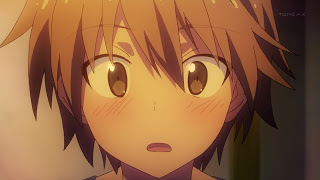 I can’t help but feel that the episode would have had more of a lasting impact if it had more or less ended there, or even better with a still-depressed Sorata discovering a grim and solitary resolve never to feel that way again. But as has happened before, the series pulled its punches when it came to the ending and went for something very conventional – an uplifting fanservice sketch with everyone sneaking into the school pool and Sorata winding up upbeat and inspired. Once more I feel that there’s a great series inside Sakurasou straining to get out, if only Kamoshida-sensei (and Okada-sensei, I suppose) would listen to the better angels of their nature and trust the audience to come along. In point of fact, what we’re getting instead is a fascinating but frustrating study in contrasts playing out on screen every week. When Sakurasou is good, it’s very, very good – and knowing that keeps me coming back for more, hoping that’s what wins out in the end.
I can’t help but feel that the episode would have had more of a lasting impact if it had more or less ended there, or even better with a still-depressed Sorata discovering a grim and solitary resolve never to feel that way again. But as has happened before, the series pulled its punches when it came to the ending and went for something very conventional – an uplifting fanservice sketch with everyone sneaking into the school pool and Sorata winding up upbeat and inspired. Once more I feel that there’s a great series inside Sakurasou straining to get out, if only Kamoshida-sensei (and Okada-sensei, I suppose) would listen to the better angels of their nature and trust the audience to come along. In point of fact, what we’re getting instead is a fascinating but frustrating study in contrasts playing out on screen every week. When Sakurasou is good, it’s very, very good – and knowing that keeps me coming back for more, hoping that’s what wins out in the end.
![[rori] Sakurasou no Pet na Kanojo - 08 [25FE7EF2].mkv_snapshot_08.21_[2012.11.28_10.06.44] [rori] Sakurasou no Pet na Kanojo - 08 [25FE7EF2].mkv_snapshot_08.21_[2012.11.28_10.06.44]](https://lh4.ggpht.com/-wQz6H1kOuww/ULVzEbUt7DI/AAAAAAACMiU/slQ7CH2afU0/%25255Brori%25255D%252520Sakurasou%252520no%252520Pet%252520na%252520Kanojo%252520-%25252008%252520%25255B25FE7EF2%25255D.mkv_snapshot_08.21_%25255B2012.11.28_10.06.44%25255D_thumb.jpg?imgmax=800) |
![[rori] Sakurasou no Pet na Kanojo - 08 [25FE7EF2].mkv_snapshot_09.22_[2012.11.28_10.07.44] [rori] Sakurasou no Pet na Kanojo - 08 [25FE7EF2].mkv_snapshot_09.22_[2012.11.28_10.07.44]](https://lh5.ggpht.com/-3XpAaWMWpxQ/ULVzGdzWN5I/AAAAAAACMik/5h28xYwOQjQ/%25255Brori%25255D%252520Sakurasou%252520no%252520Pet%252520na%252520Kanojo%252520-%25252008%252520%25255B25FE7EF2%25255D.mkv_snapshot_09.22_%25255B2012.11.28_10.07.44%25255D_thumb.jpg?imgmax=800) |
![[rori] Sakurasou no Pet na Kanojo - 08 [25FE7EF2].mkv_snapshot_09.54_[2012.11.28_10.08.34] [rori] Sakurasou no Pet na Kanojo - 08 [25FE7EF2].mkv_snapshot_09.54_[2012.11.28_10.08.34]](https://lh5.ggpht.com/-Q8vBXU1U_2w/ULVzI1sk8QI/AAAAAAACMiw/bZn0rKxoJeY/%25255Brori%25255D%252520Sakurasou%252520no%252520Pet%252520na%252520Kanojo%252520-%25252008%252520%25255B25FE7EF2%25255D.mkv_snapshot_09.54_%25255B2012.11.28_10.08.34%25255D_thumb.jpg?imgmax=800) |
![[rori] Sakurasou no Pet na Kanojo - 08 [25FE7EF2].mkv_snapshot_09.55_[2012.11.28_10.08.18] [rori] Sakurasou no Pet na Kanojo - 08 [25FE7EF2].mkv_snapshot_09.55_[2012.11.28_10.08.18]](https://lh6.ggpht.com/-Hfi4J8IHc-4/ULVzLSxTFbI/AAAAAAACMjA/2h5xYU5pO0A/%25255Brori%25255D%252520Sakurasou%252520no%252520Pet%252520na%252520Kanojo%252520-%25252008%252520%25255B25FE7EF2%25255D.mkv_snapshot_09.55_%25255B2012.11.28_10.08.18%25255D_thumb.jpg?imgmax=800) |
![[rori] Sakurasou no Pet na Kanojo - 08 [25FE7EF2].mkv_snapshot_10.10_[2012.11.28_10.09.10] [rori] Sakurasou no Pet na Kanojo - 08 [25FE7EF2].mkv_snapshot_10.10_[2012.11.28_10.09.10]](https://lh4.ggpht.com/-nNgmb8K2FdI/ULVzNkI8BRI/AAAAAAACMjU/OHSNYx9uvSg/%25255Brori%25255D%252520Sakurasou%252520no%252520Pet%252520na%252520Kanojo%252520-%25252008%252520%25255B25FE7EF2%25255D.mkv_snapshot_10.10_%25255B2012.11.28_10.09.10%25255D_thumb.jpg?imgmax=800) |
![[rori] Sakurasou no Pet na Kanojo - 08 [25FE7EF2].mkv_snapshot_11.33_[2012.11.28_10.10.33] [rori] Sakurasou no Pet na Kanojo - 08 [25FE7EF2].mkv_snapshot_11.33_[2012.11.28_10.10.33]](https://lh6.ggpht.com/-pAqWXh0I6JE/ULVzP7H5s1I/AAAAAAACMjg/9BwQI2D_LjM/%25255Brori%25255D%252520Sakurasou%252520no%252520Pet%252520na%252520Kanojo%252520-%25252008%252520%25255B25FE7EF2%25255D.mkv_snapshot_11.33_%25255B2012.11.28_10.10.33%25255D_thumb.jpg?imgmax=800) |
![[rori] Sakurasou no Pet na Kanojo - 08 [25FE7EF2].mkv_snapshot_11.56_[2012.11.28_10.10.55] [rori] Sakurasou no Pet na Kanojo - 08 [25FE7EF2].mkv_snapshot_11.56_[2012.11.28_10.10.55]](https://lh5.ggpht.com/-loGyv5-AXVM/ULVzSXy-OJI/AAAAAAACMj0/JINbTAeE0UE/%25255Brori%25255D%252520Sakurasou%252520no%252520Pet%252520na%252520Kanojo%252520-%25252008%252520%25255B25FE7EF2%25255D.mkv_snapshot_11.56_%25255B2012.11.28_10.10.55%25255D_thumb.jpg?imgmax=800) |
![[rori] Sakurasou no Pet na Kanojo - 08 [25FE7EF2].mkv_snapshot_12.13_[2012.11.28_10.11.13] [rori] Sakurasou no Pet na Kanojo - 08 [25FE7EF2].mkv_snapshot_12.13_[2012.11.28_10.11.13]](https://lh4.ggpht.com/-ah8yiUuI_J4/ULVzU8K_tPI/AAAAAAACMkA/cbXbBLP5CYc/%25255Brori%25255D%252520Sakurasou%252520no%252520Pet%252520na%252520Kanojo%252520-%25252008%252520%25255B25FE7EF2%25255D.mkv_snapshot_12.13_%25255B2012.11.28_10.11.13%25255D_thumb.jpg?imgmax=800) |
![[rori] Sakurasou no Pet na Kanojo - 08 [25FE7EF2].mkv_snapshot_16.30_[2012.11.28_10.15.30] [rori] Sakurasou no Pet na Kanojo - 08 [25FE7EF2].mkv_snapshot_16.30_[2012.11.28_10.15.30]](https://lh4.ggpht.com/-uwbb__5VVgA/ULVzXJLKl_I/AAAAAAACMkU/CIxanPfobuI/%25255Brori%25255D%252520Sakurasou%252520no%252520Pet%252520na%252520Kanojo%252520-%25252008%252520%25255B25FE7EF2%25255D.mkv_snapshot_16.30_%25255B2012.11.28_10.15.30%25255D_thumb.jpg?imgmax=800) |
![[rori] Sakurasou no Pet na Kanojo - 08 [25FE7EF2].mkv_snapshot_17.08_[2012.11.28_10.16.08] [rori] Sakurasou no Pet na Kanojo - 08 [25FE7EF2].mkv_snapshot_17.08_[2012.11.28_10.16.08]](https://lh3.ggpht.com/-ToLO4Cn4BBQ/ULVzZUm4swI/AAAAAAACMkk/6jCJbKABGvs/%25255Brori%25255D%252520Sakurasou%252520no%252520Pet%252520na%252520Kanojo%252520-%25252008%252520%25255B25FE7EF2%25255D.mkv_snapshot_17.08_%25255B2012.11.28_10.16.08%25255D_thumb.jpg?imgmax=800) |
![[rori] Sakurasou no Pet na Kanojo - 08 [25FE7EF2].mkv_snapshot_18.01_[2012.11.28_10.17.01] [rori] Sakurasou no Pet na Kanojo - 08 [25FE7EF2].mkv_snapshot_18.01_[2012.11.28_10.17.01]](https://lh5.ggpht.com/-nttwX8d4aiI/ULVzboWVXOI/AAAAAAACMkw/iS8oIrvxbp8/%25255Brori%25255D%252520Sakurasou%252520no%252520Pet%252520na%252520Kanojo%252520-%25252008%252520%25255B25FE7EF2%25255D.mkv_snapshot_18.01_%25255B2012.11.28_10.17.01%25255D_thumb.jpg?imgmax=800) |
![[rori] Sakurasou no Pet na Kanojo - 08 [25FE7EF2].mkv_snapshot_18.39_[2012.11.28_10.17.49] [rori] Sakurasou no Pet na Kanojo - 08 [25FE7EF2].mkv_snapshot_18.39_[2012.11.28_10.17.49]](https://lh4.ggpht.com/-upsL5EyqmmQ/ULVzeiCMtMI/AAAAAAACMlE/FxBbp_dQoHQ/%25255Brori%25255D%252520Sakurasou%252520no%252520Pet%252520na%252520Kanojo%252520-%25252008%252520%25255B25FE7EF2%25255D.mkv_snapshot_18.39_%25255B2012.11.28_10.17.49%25255D_thumb.jpg?imgmax=800) |
![[rori] Sakurasou no Pet na Kanojo - 08 [25FE7EF2].mkv_snapshot_19.12_[2012.11.28_10.18.22] [rori] Sakurasou no Pet na Kanojo - 08 [25FE7EF2].mkv_snapshot_19.12_[2012.11.28_10.18.22]](https://lh4.ggpht.com/-4qlNjEirB_M/ULVzg9T_81I/AAAAAAACMlU/AqtSlckHOiQ/%25255Brori%25255D%252520Sakurasou%252520no%252520Pet%252520na%252520Kanojo%252520-%25252008%252520%25255B25FE7EF2%25255D.mkv_snapshot_19.12_%25255B2012.11.28_10.18.22%25255D_thumb.jpg?imgmax=800) |
![[rori] Sakurasou no Pet na Kanojo - 08 [25FE7EF2].mkv_snapshot_19.33_[2012.11.28_10.18.43] [rori] Sakurasou no Pet na Kanojo - 08 [25FE7EF2].mkv_snapshot_19.33_[2012.11.28_10.18.43]](https://lh5.ggpht.com/-FMnf3-9Mapo/ULVzjtfhNSI/AAAAAAACMlk/XV4pizgSJww/%25255Brori%25255D%252520Sakurasou%252520no%252520Pet%252520na%252520Kanojo%252520-%25252008%252520%25255B25FE7EF2%25255D.mkv_snapshot_19.33_%25255B2012.11.28_10.18.43%25255D_thumb.jpg?imgmax=800) |
![[rori] Sakurasou no Pet na Kanojo - 08 [25FE7EF2].mkv_snapshot_19.40_[2012.11.28_10.18.50] [rori] Sakurasou no Pet na Kanojo - 08 [25FE7EF2].mkv_snapshot_19.40_[2012.11.28_10.18.50]](https://lh6.ggpht.com/-PMtF1T9o8KE/ULVzmk_iHDI/AAAAAAACMlw/0Pby_C0cpGc/%25255Brori%25255D%252520Sakurasou%252520no%252520Pet%252520na%252520Kanojo%252520-%25252008%252520%25255B25FE7EF2%25255D.mkv_snapshot_19.40_%25255B2012.11.28_10.18.50%25255D_thumb.jpg?imgmax=800) |
![[rori] Sakurasou no Pet na Kanojo - 08 [25FE7EF2].mkv_snapshot_20.11_[2012.11.28_10.19.20] [rori] Sakurasou no Pet na Kanojo - 08 [25FE7EF2].mkv_snapshot_20.11_[2012.11.28_10.19.20]](https://lh5.ggpht.com/-1pQtHZ3eDGg/ULVzpC-boNI/AAAAAAACMmE/qXtruTPXUl8/%25255Brori%25255D%252520Sakurasou%252520no%252520Pet%252520na%252520Kanojo%252520-%25252008%252520%25255B25FE7EF2%25255D.mkv_snapshot_20.11_%25255B2012.11.28_10.19.20%25255D_thumb.jpg?imgmax=800) |
![[rori] Sakurasou no Pet na Kanojo - 08 [25FE7EF2].mkv_snapshot_20.46_[2012.11.28_10.20.06] [rori] Sakurasou no Pet na Kanojo - 08 [25FE7EF2].mkv_snapshot_20.46_[2012.11.28_10.20.06]](https://lh5.ggpht.com/-sn1bv68Rs3M/ULVzrpZp6CI/AAAAAAACMmQ/MLb3yECDDXI/%25255Brori%25255D%252520Sakurasou%252520no%252520Pet%252520na%252520Kanojo%252520-%25252008%252520%25255B25FE7EF2%25255D.mkv_snapshot_20.46_%25255B2012.11.28_10.20.06%25255D_thumb.jpg?imgmax=800) |
![[rori] Sakurasou no Pet na Kanojo - 08 [25FE7EF2].mkv_snapshot_22.50_[2012.11.28_10.22.09] [rori] Sakurasou no Pet na Kanojo - 08 [25FE7EF2].mkv_snapshot_22.50_[2012.11.28_10.22.09]](https://lh4.ggpht.com/-HpfQIbNPijs/ULVzuOAiAJI/AAAAAAACMmg/jea0qeOmFvw/%25255Brori%25255D%252520Sakurasou%252520no%252520Pet%252520na%252520Kanojo%252520-%25252008%252520%25255B25FE7EF2%25255D.mkv_snapshot_22.50_%25255B2012.11.28_10.22.09%25255D_thumb.jpg?imgmax=800) |



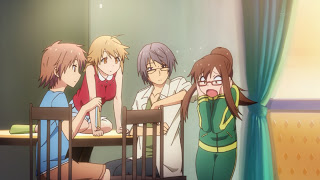


Anonymous
November 28, 2012 at 2:32 amThe point of that pool part was in my opinion an effort by his friends to give him something to do so he doesn't spend all his time brooding over his failure and feel sorry for himself, he realized the gesture and accepted it in the offer in the spirit it was given. The deeper meanings are present underneath the arguably questionable fanservice.
admin
November 28, 2012 at 2:54 amI agree that was the point – I just felt it was a very safe and conventional narrative choice. Not terrible – just conventional.
Sammy
November 28, 2012 at 3:18 amWell, too bad it looks like next week's episode is back to last week's crime mode. This time it's a foreign broken-Japanese blonde girl trope. God damn it. BTW, she looks just like Mashiro, except for blue eyes and slightly more bleached blonde hair. It's what happens when you have a Japanese girl with blonde hair (stop arguing, "Mashiro Shiina" is a 100% Japanese name); it's very confusing!
Reckoner
November 28, 2012 at 5:06 amI actually find Nanami's character generally more sympathetic and likable than most of the cast.
However about the more general point of a great series struggling to come to the surface, I totally agree. For me its the general sexually exploitative fanservice hijinks that hold back this show the most (Along side some insufferable tropes like last episode). The writer really shouldn't need to rely on this to make a good story… It's definitely better when it avoids it.
Highway
November 29, 2012 at 3:55 pmNot that generally sexually exploitative fanservice hijinks particularly bother me (they *can* go over the top, like Campione! did at the end), but I think in Sakurasou they actually do a good job in highlighting the differences between the girls in the cast. It's not like the usual show where all the girls react the exact same way to transgressions by the hapless male lead (see, for instance, TLR: Darkness this season). The different reactions by the three girls – Misaki's general enthusiastic and careless forwardness, Mashiro's seeming obliviousness, and Nanami's internally conflicted "I want him to, but a lady shouldn't" – separate this show, for me, from a general harem trope, and breathe a bit of a different life into their interactions.
Highway
November 28, 2012 at 6:11 amI've really warmed to Nanami's character as well, and have really enjoyed every bit of the show so far, even Yuuko, even the pool party, and even the escape afterwards. And I really like that the introduction and development of Nanami has actually clouded the OTP nature of the early episodes of the show. I think Nanami has really moved from the character on the outside, watching the Mashiro x Sorata developing relationship, to someone who is developing her own relationship with Sorata, and seemingly doing it in a way that's not just a competition between her and Mashiro, although there are definitely elements of that.
And I find it fun to watch.
Anonymous
November 28, 2012 at 2:19 pmActually, I think the pool section was a pretty good ending to the episode. Rather than brooding for the rest of the episode, it was nice to see an effort from both Sorata and his friends to pull him out of there.
The scene with the ED playing as they all ran down that road strikes me as one of the best moments of the series so far.
admin
November 28, 2012 at 2:23 pmLike I said, it wasn't terrible or anything – it just felt like a bit of a cop-out to me. It would have been much more interesting to tackle that situation in a way that hasn't been done a hundred time before.
Anonymous
November 28, 2012 at 9:00 pmI thought it was a touching friendship moment between the dormmates but that's opinions for you.
Anonymous
November 30, 2012 at 12:37 pmI think the approach taken wasn't that common. The common way out is to let him mope around for an episode or two, followed by someone slapping some sense into him. The good execution here comes from the fact that it's not only outside influence that gets him over it. He realizes he's in a slump, he doesn't even feel much like going out, but he mans up and doesn't shut his friends off, and forces himself to let out some steam. I think that the protagonist's reaction here is subtly but very significantly different from the rest of the pack.
melodic thoughts
November 30, 2012 at 5:07 pmi think you're getting a lot of people disagreeing with you here.
conventional or not, i actually feel that sorata ending as he had there, gloomy, is the conventional narrative. maybe not conventional, but have we not seen it before. him feeling inferior to mashiro back at the love hotel? but yet, sakurasou throws us back into what it does best: COMEDY, with some good old fun and realizations among all that. sakurasou can never be a gloomy show, what it shines at is the deep revelations it makes amidst all the ecchi and fun! that's why i think most of us like it 😀
AND AND AND, i think nanami is awesome as a character, although i find mashiro and her one-sided fixation to get sorata to look at them(and their bodayyy) slightly tiresome. i mean come on, talk about obvious. it's just weird how sorata blindsides it, and somehow it still comes off naturally.
admin
November 30, 2012 at 11:27 pmDisgreement is fine, doesn't bother me (or make me question my own take). The balance of opinion on the imouto ep was overwhelmingly positive on the net as a whole, but that doesn't make me any less convinced it was a disaster.
melodic thoughts
December 1, 2012 at 6:00 amwell i agree the imouto episode was HORRIBLE. it almost made me drop the show, but misaki-senpai drag me back to it